Market Opportunity
- The UK market needs Eco friendly showers that can operate under low flow rate and works without hot water supply.
- Currently, its only Aqualisa Quarts and a handful of competitors who can offer this product.
- However, Aqualisa Quarts has the opportunity of outperforming the above competitor if the breakthrough innovative electric shower is well presented in the market.
- Aqualisa has the opportunity of partnering with plumbers and developers to increase product acceptance and visibility in the market.
- This can be integrated with an extensive product and promotion to improve on brand awareness.
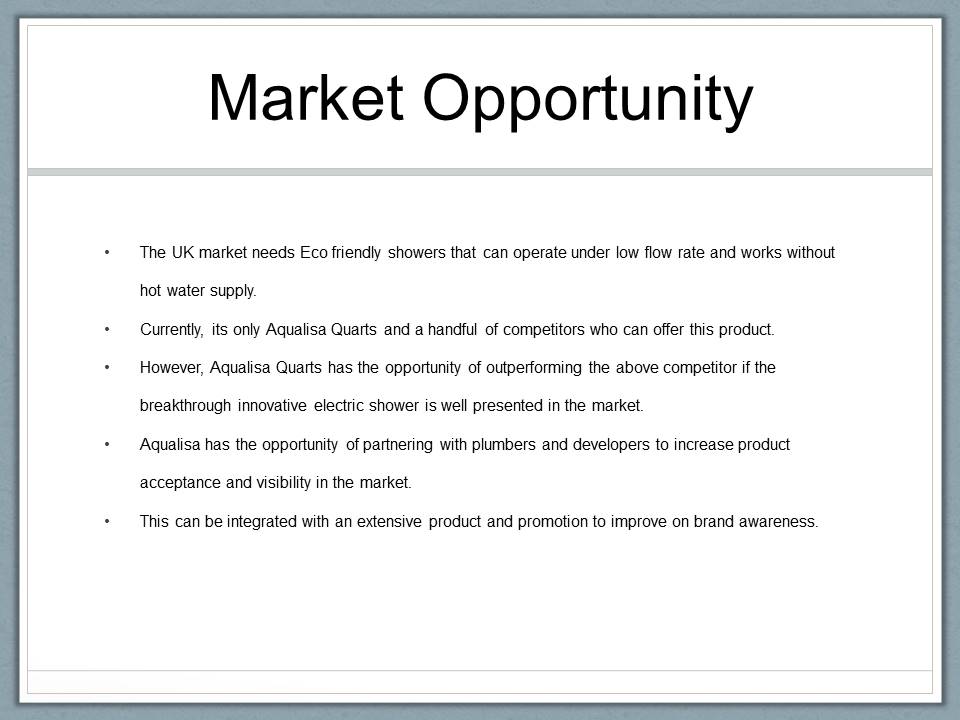
Sales Objectives
- The first objective is to increase sales by 10% monthly for the first three months, 15% monthly for the next six months, and cup it at 30% within 12 monthly and subsequent period.
- The target revenue is £80,000 within the first month followed by an increase to £96,000 in second month, and £108,000 in the third month. This will improve to £157,000 in the sixth month and £298, 000 at the end of the first year.
- The second sales objective is to improve product visibility by similar percentage for the three periods through advertisement and promotion strategies.
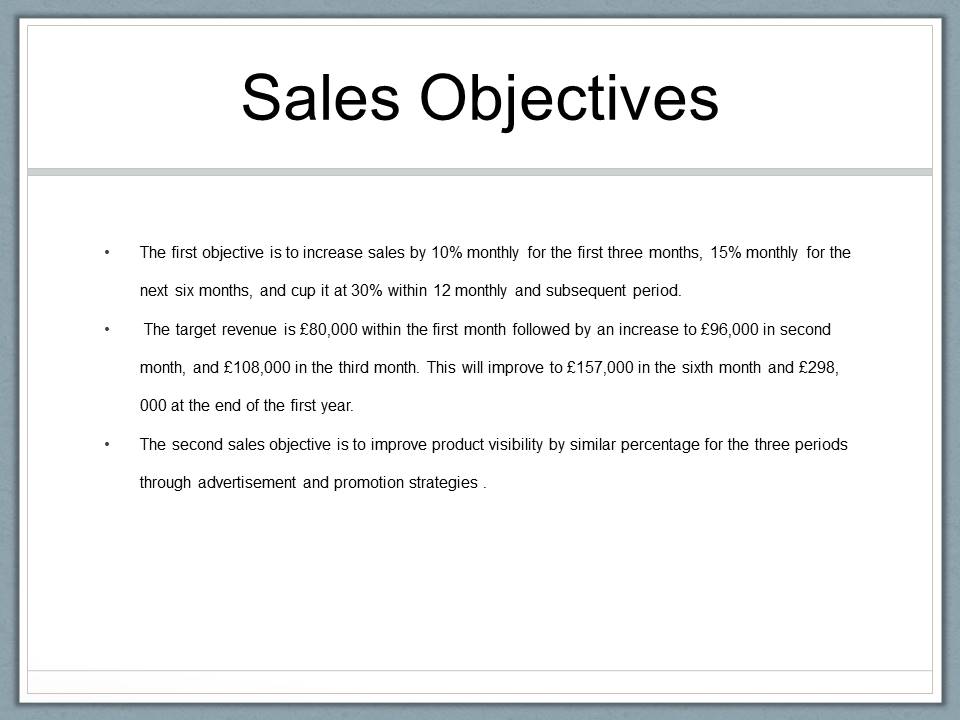
B2B Sales Environment
- The business will focus on three small and medium independent retailers within the Kingston Upon Thames.
- These retailers are Plumb Center Kingston, Screwfix, and Kingston Plumbase.
- The business will also target two showrooms within the Kingston Upon Thames.
- These showrooms are Plumber Center and Plumbet Merchants.
- The business will also partner with the DIY stores spread across the Kingston Upon Thames.
- The rationale for choosing these independent retailers is to improve on product visibility, availability, and expand the current distribution network.
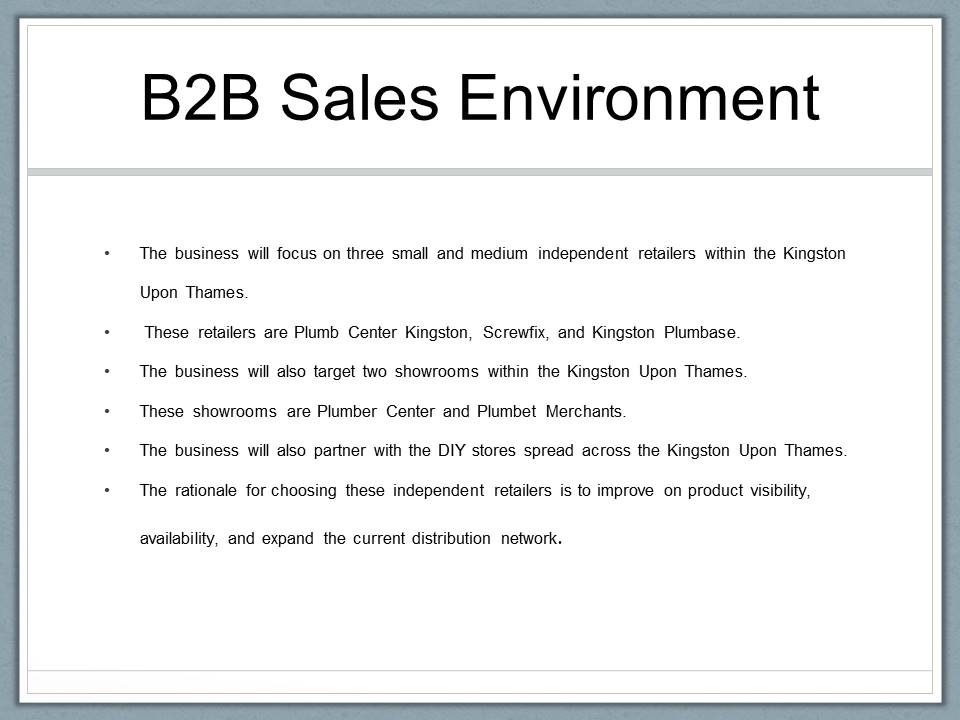
Segmentation & Positioning
- The products retailed by Aqualisa Quarts will be positioned as the first of their kind in the market to integrate the touchtonic technology in shower (Kotler & Keller 2012).
- The positioning will target the DIY customers, plumbers, and developers.
- The first priority pricing segment will be the value segment, since it will attract majority of customers, that is, up to 60% of potential clients .
- This will be followed by the standard segment to attract the property developer market, consisting of up to 35% of potential clients.
- The premium segment will be the least targeted since it is the least populated market, consisting of up to 20% of the targeted market.
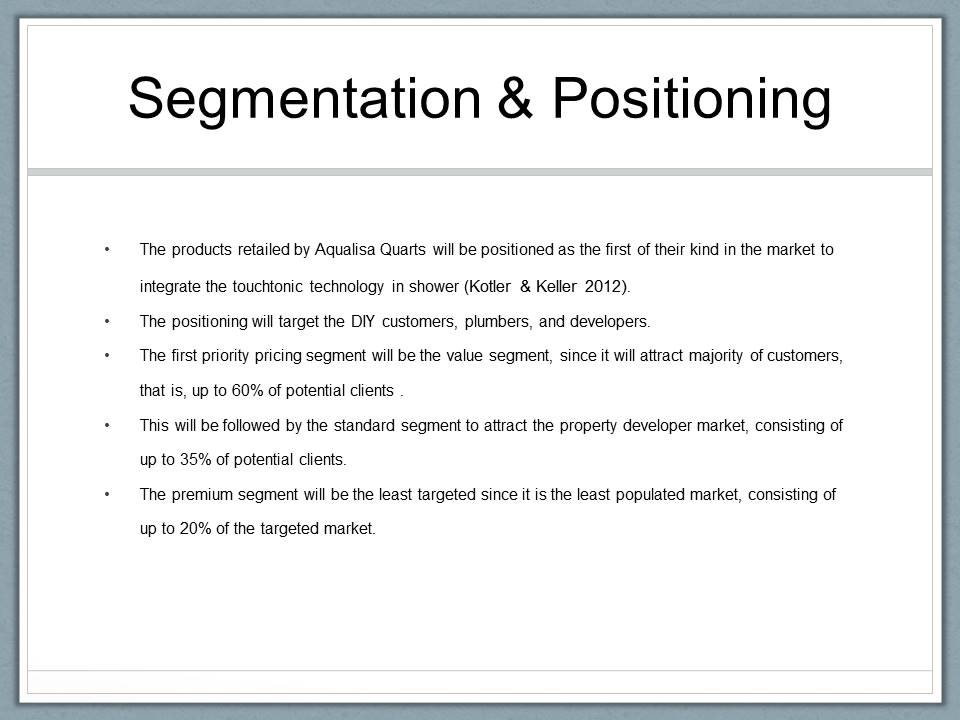
The Numbers
Premium segment
The targeted number of customers for this segment is 8,000 within a period of one year. This is because the Kingston Upon Thames market serves approximately 50,000 of such clients. Therefore, Aqualisa Quarts will target 16% of this population.
Standard Segment
The targeted number of customers for this segment is 20,000 within a period of one year. This is because the Kingston Upon Thames market serves approximately 150,000 of such clients. Therefore, Aqualisa Quarts will target 14% of this population.
Value segment
The targeted number of customers for this segment is 40,000 within a period of one year. This is because the Kingston Upon Thames market serves approximately 300,000 of such clients. Therefore, Aqualisa Quarts will target 15% of this population.
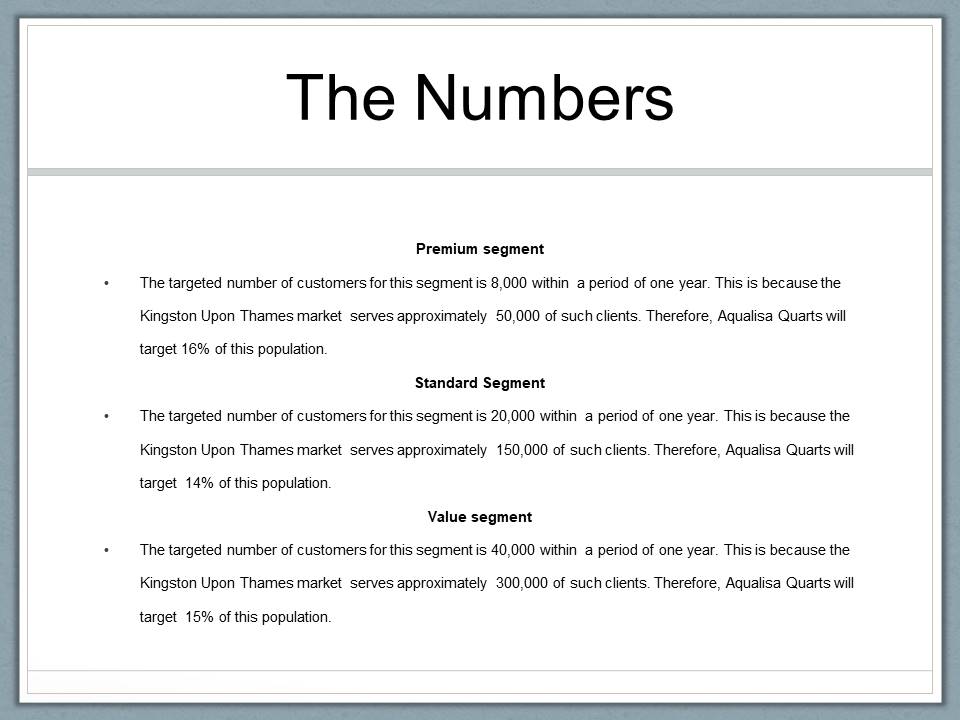
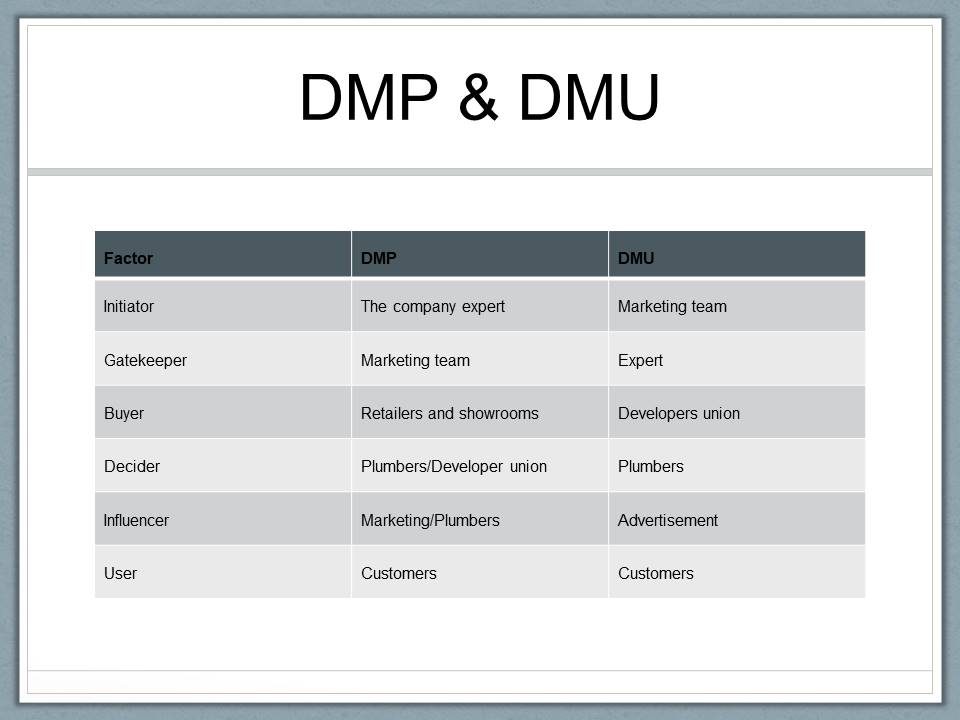
Geographic Concentration
The product penetration strategy will be concentrate within the eastern part of the Kingston Upon Thames, where construction has been concentrated.
This will be followed by targeting the already developed neighborhoods within the Kingston Upon Thames.
Lastly, the targeting will be shifted to existing institutions such as schools, hospitals, hotels, and other buildings.
However, the company will ensure that the there is even spread in product distribution within the entire Kingston Upon Thames region for the DIY customers.
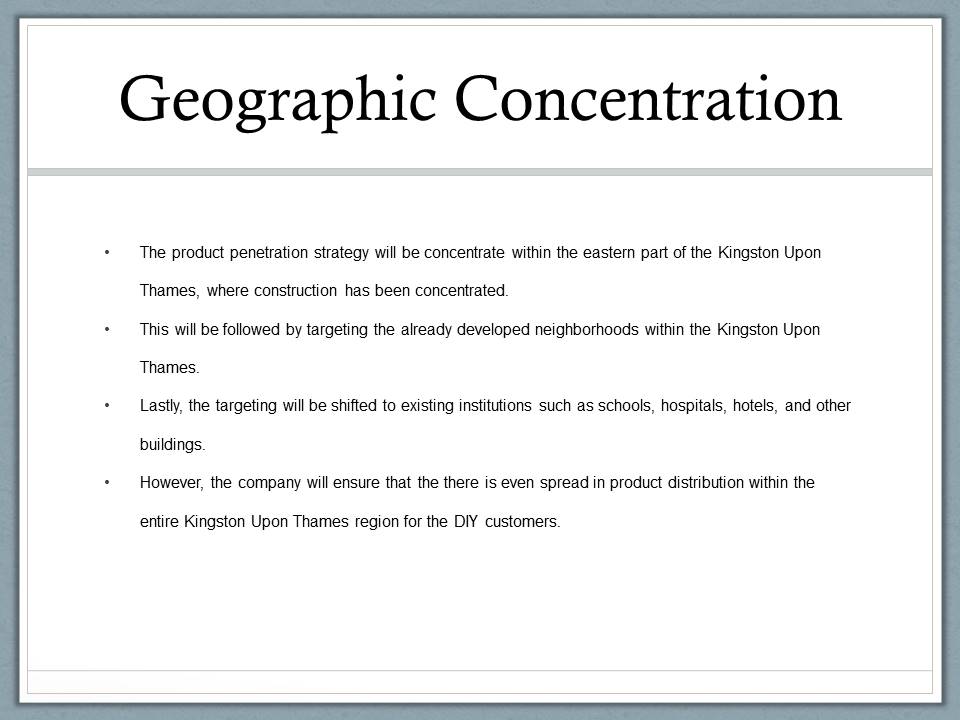
Sales Cycles
The sales cycles will consist of five stages, which are prospecting, setting appointment, making presentation, clarifying issues, and closing.
The prospecting stage is necessary to identify potential clients.
Setting appointment stage will guarantee proper use of time and meeting potential clients.
Making presentation is necessary to explain the advantages of Aqualisa showers.
Clarification stage gives the company an opportunity to pitch the shower products against other existing products.
Closing state will climate with the actual sale of the shower products and signing of contract.
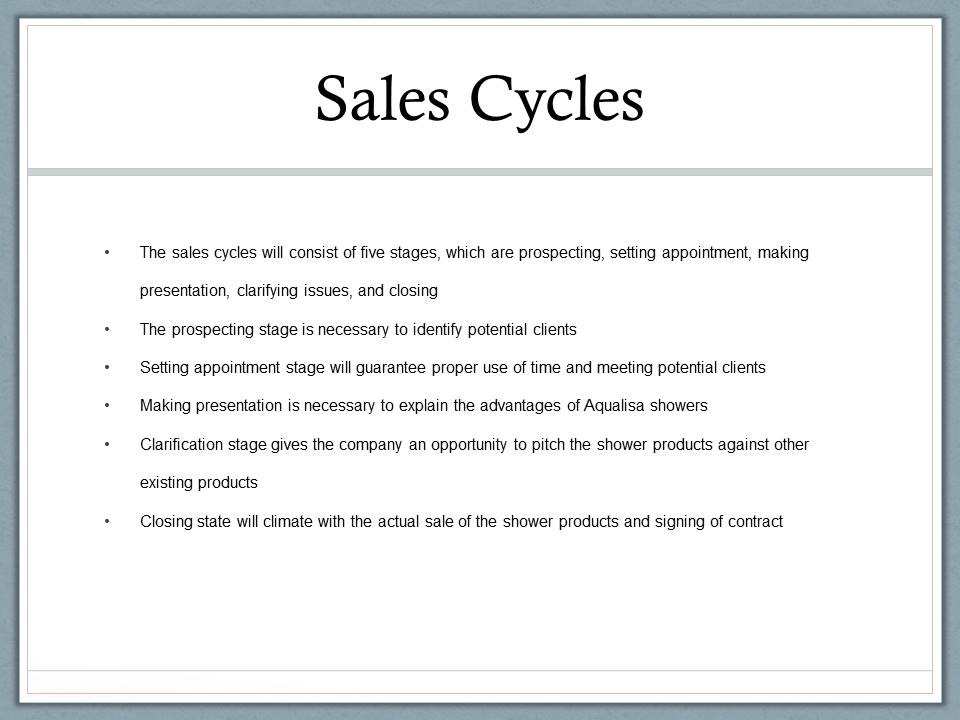
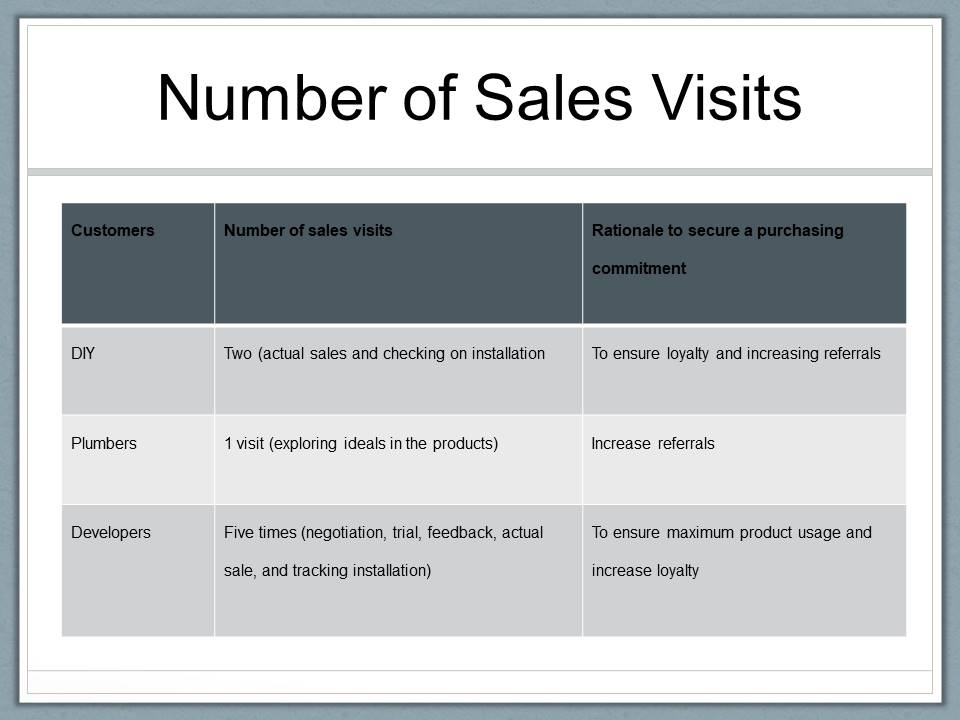
Time Interval
The time interval between visits will be a month to give customers enough time for trails of the product.
The one month period will be enough to generate feedback from customers and make replacements.
The one month interval is affordable on the side of the company, especially in the long-run.
Lastly, the one month interval will enable to company to plan for sales and promotion activities in advance.
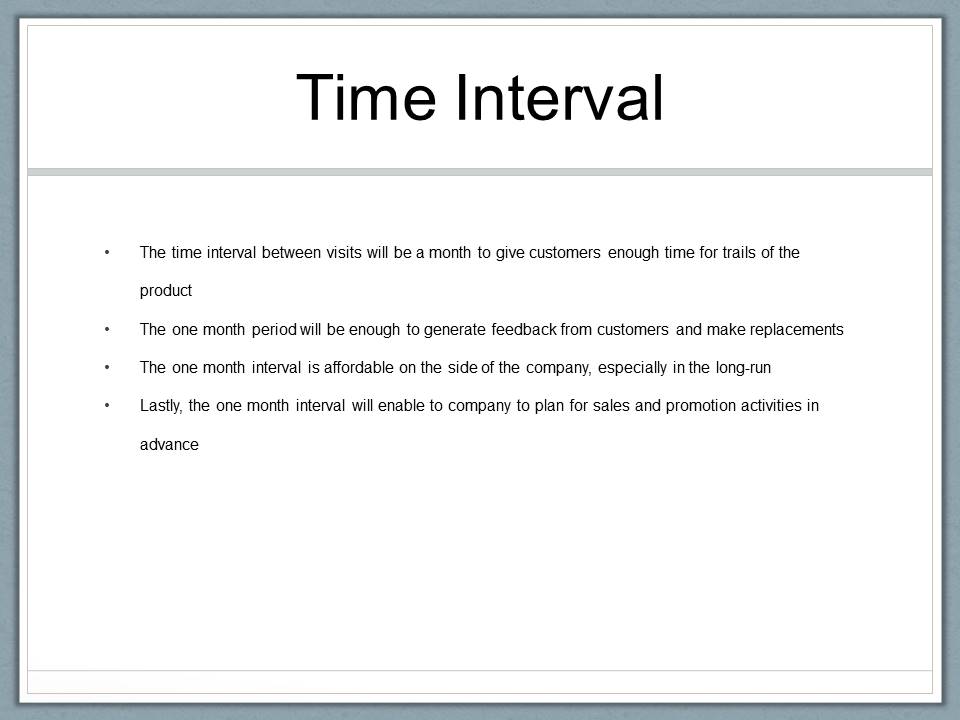
Sales Objectives Per Call
Prospecting stage: Explain the benefits of the shower products and its usage.
Setting appointment: Zero-in on potential client to avoid many unfruitful sales attempts.
Making presentation: Win the customer with the ideal aspect of the shower product through catching attention by selling benefits such as Eco friendliness, five years free warranty, and product efficiency.
Clarifying issues: Address all concerns of the customer and give assurance on benefits attached on the product.
Closing: Make sale and win loyalty of customer to increase chances of future referrals and repeat sales (Kitchen, Kim, & Shultz 2008).
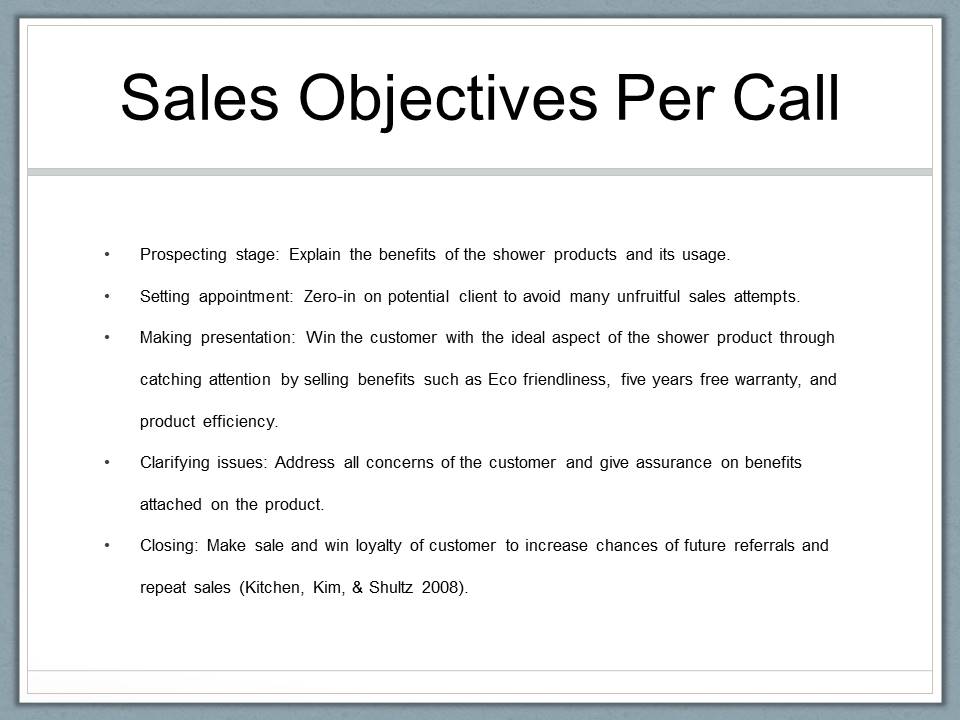
Representatives
The company will need 30 representatives to cover the entire region of Kingston Upon Thames for a period of one year.
The representatives will be divided into four groups consisting of six agents of to cover the four regions within the Kingston Upon Thames.
The remaining representatives will be enrolled for the corporate and stand-by sales at company level.
The groups consisting of 6 agents will make alternative visits of three representatives per visit.
This will make the sales activities more cost effective and sustainable in the long-term.
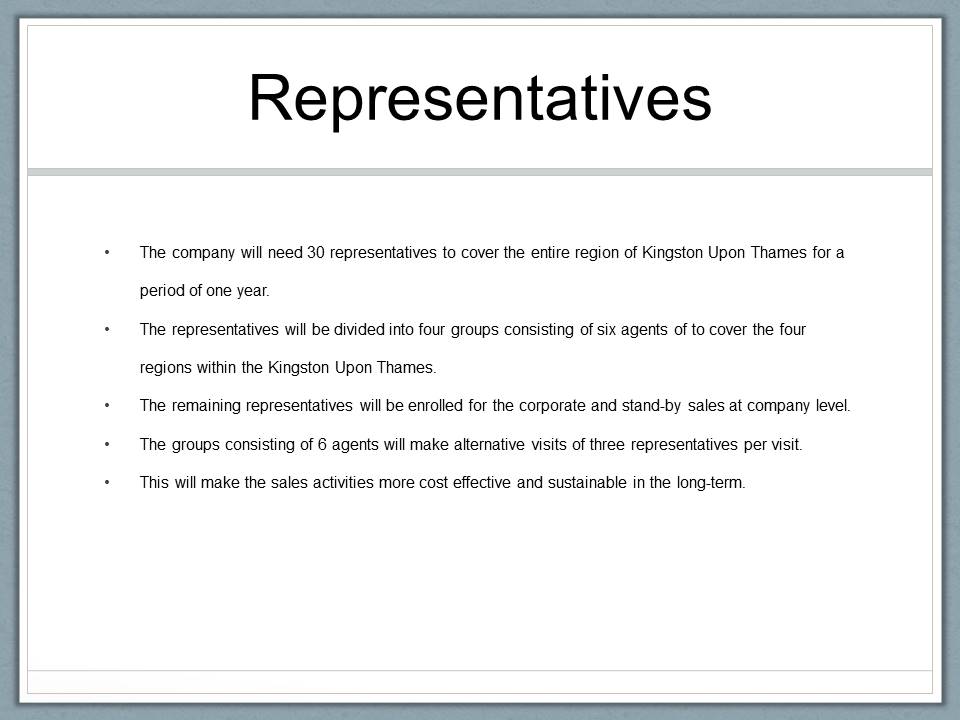
Training
The thirty sales representatives will require additional training on pitching, product function, and etiquette.
Training on product pitching will reduce instances of failed sales (Elder & Krishna 2012).
Product function training will ensure that the representatives are conversant with the product to minimize instances of product-marketer disconnect.
Training on etiquette will improve sales through positive customer perception on the product, the sales agent, and the company as part of the product acquisition process (Luck & Moffat 2009).
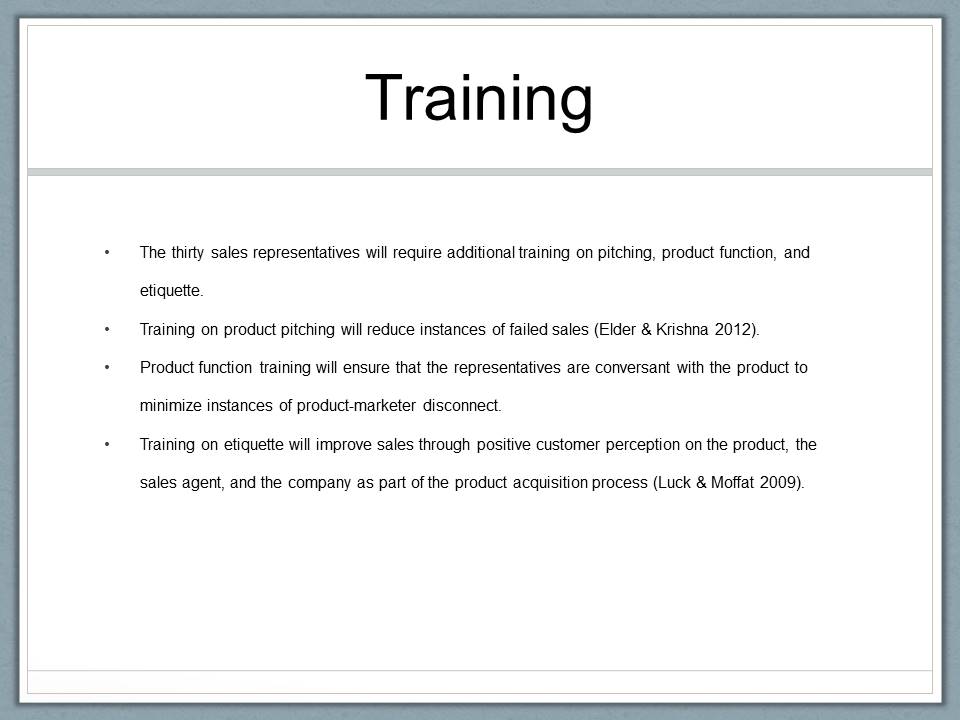
Recruitment Process
The sales agents will be recruited in a competitive manner with minimal high school diploma qualification.
This level of qualification is necessary to ensure that the prospects can express themselves in a professional manner and easy to train.
Recruitment will be done online with only shortlisted candidates invited for interview.
Online recruitment is fast and very cost effective.
Successful candidates will be passed through product training before being formally hired.
The training process will be an induction into the product corporate culture and the targets expected from each a representative for a specified period (Eagle, Kitchen, & Bulmer 2007).
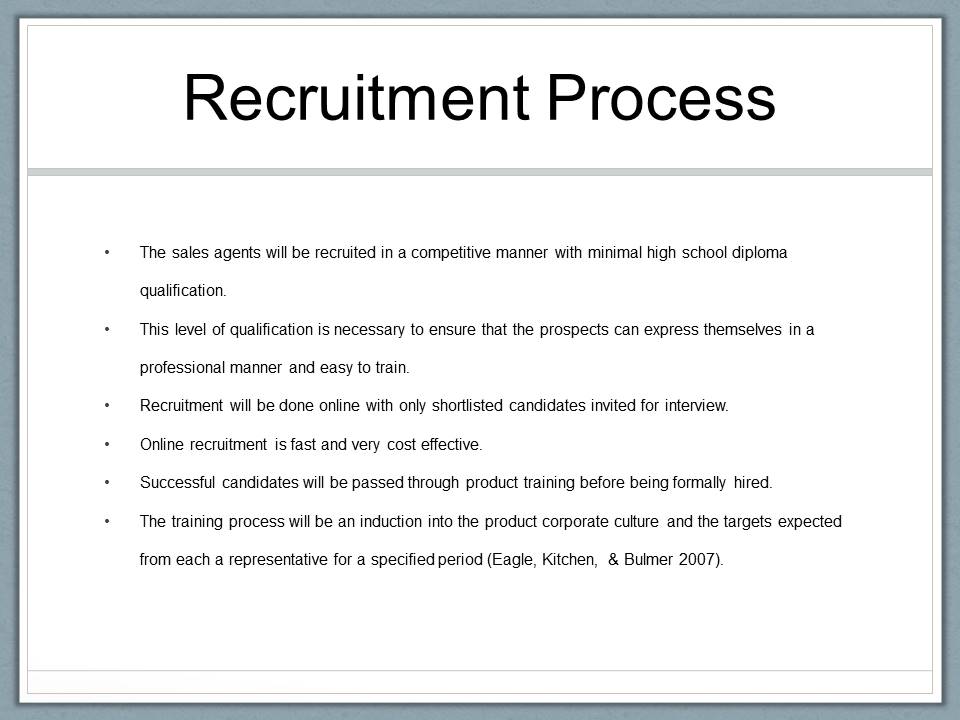
Cost of Sales Representatives
Salaries will be £10,000 per annum per person.
This is equivalent to £300,000 for the thirty representatives.
Other costs will be 50% of the salary per person to cover for allowances such as fuel, rent, and medical cover.
This amount to £150,000 per year for the thirty representatives.
Therefore, the total cost for all the representatives for a period of one year is £300,000+ £150,000 = £450,000.
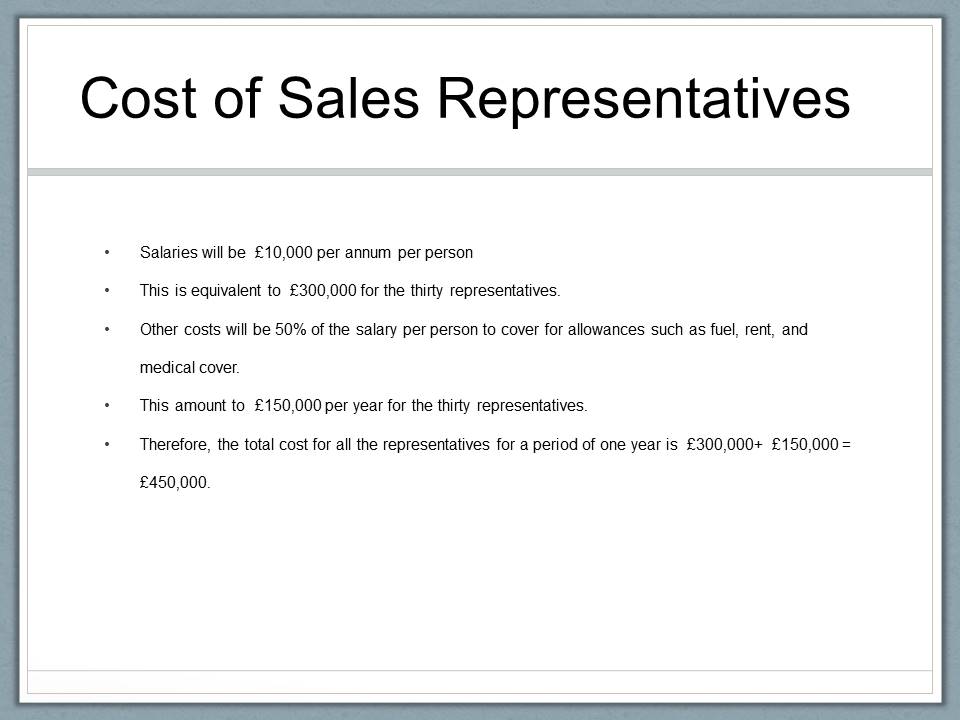
Local Communication & Promotion
The company will integrate product banners and user demonstrations to carry out direct sales promotion
The company will also rely on SMS, emails, and direct mail to promote the products, especially when targeting the DIY customers.
The company can use the local media channels such as television, radio, and social media to carry out promotion activities.
The company can also buy advertisement space in the local dailies, municipal advertisement billboards, and electronic screens available in the targeted region.
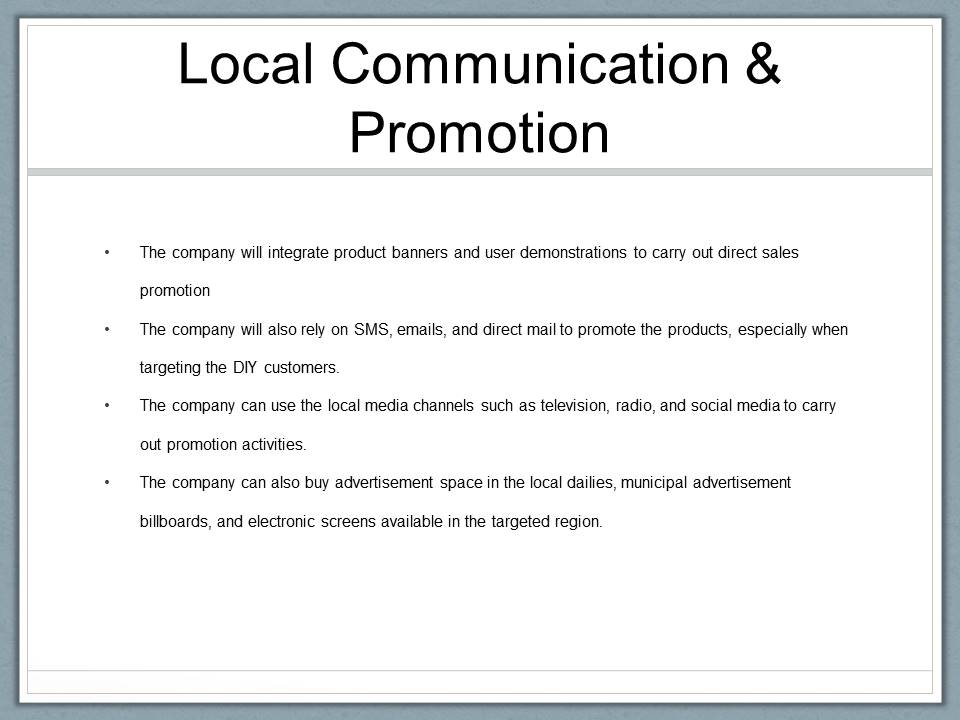
Promotional Tools
The promotional tools that the company might use to support sales call mobile phones, SMS backup/company app, and call support centre (Birdsall & Johnston 2010).
The mobile phones airtime estimated to cost £50, 000 per year.
The call support centre and data backup will cost £250,000 per year.
The SMS backup and company app will cost £150,000 per year.
This means that the total cost is estimated at £450,000 for the whole year.
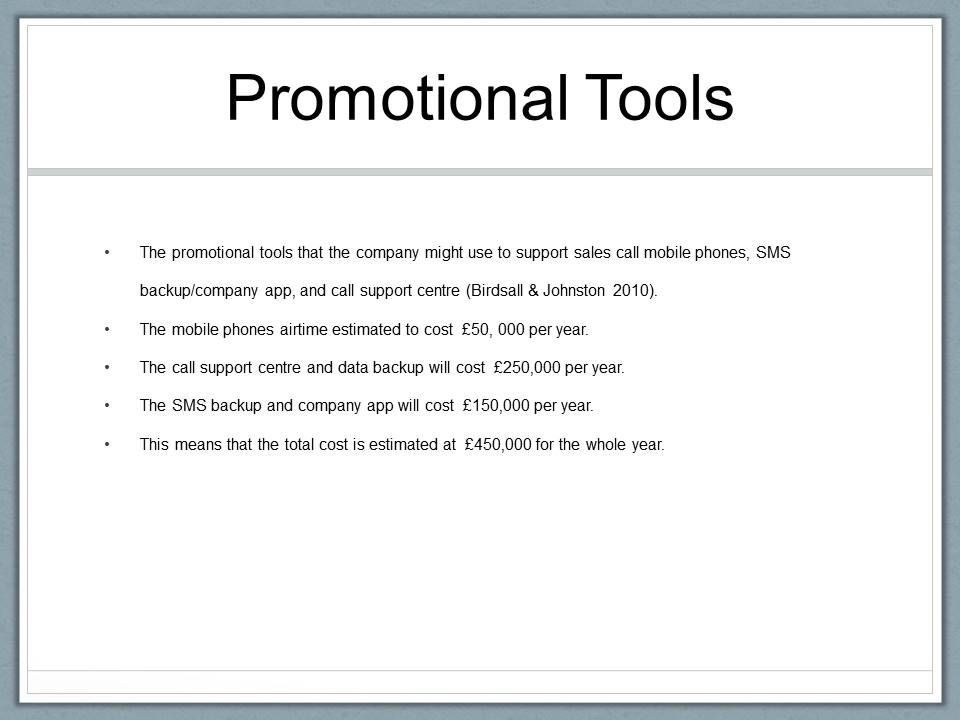
Budget Plan
The budget requirement to fund each communication and promotion channel is summarized in the table below for a period of one year.
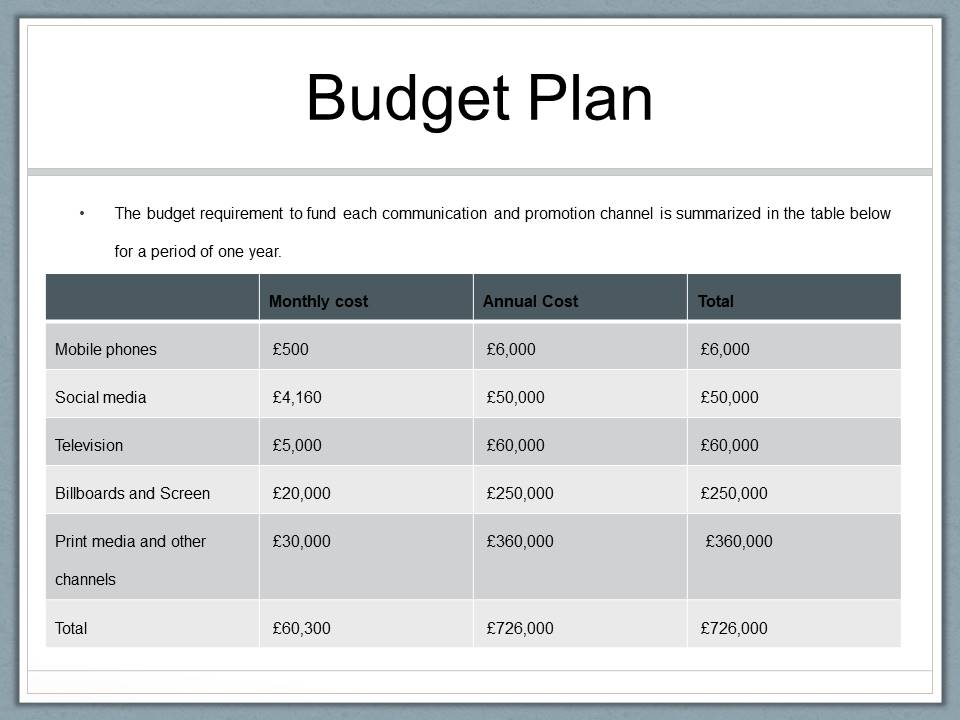
Selling Price
From the budget and cost of maintaining the representation, the total cost of promotion plan will be £1,176,000 for a period of one year.
The proposed number of units to be sold will be 68,000.
To recover the cost, each product must be sold at £18.
Factoring other costs and average selling price in the market, the average selling price will be £150 per unit.
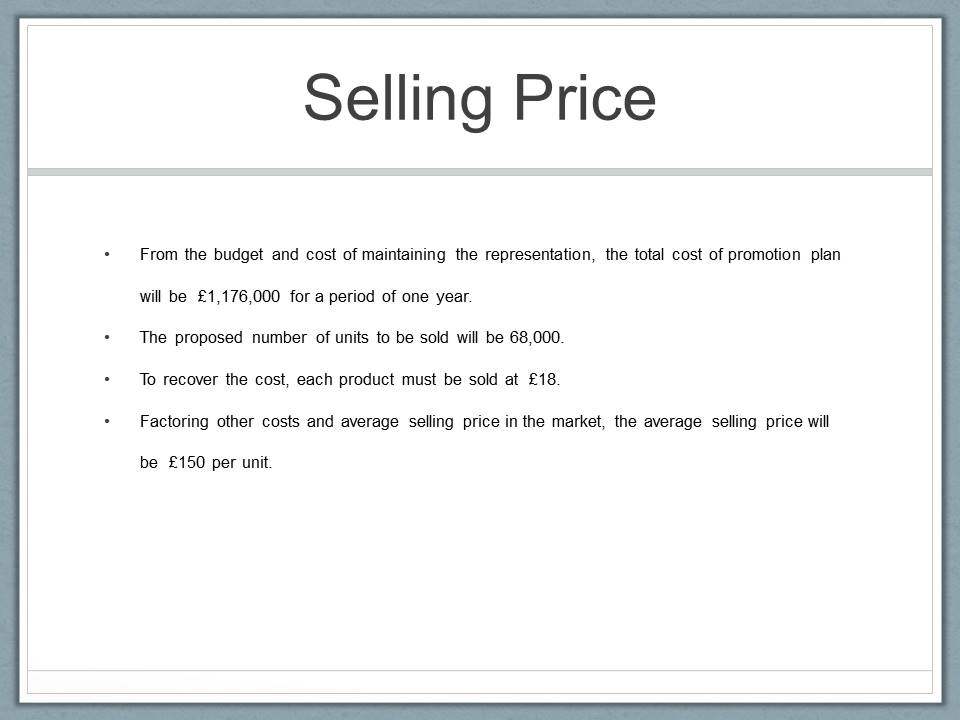
Margin For Achieving the Objectives
To achieved the marketing plan objectives, the margin to work with will be the cost, which is £1,176,000 unit/ £150 per unit sale price.
This equal to 7840 units on the lower side and the target of 68,000 on the higher side.
The margin was derived from dividing the total cost of promotion with the proposed unit price of each shower unit.
The rationale for this approach to derive the minimum possible units to be sold for the promotional activities to be justifiable.
The target of 68,000 was arrived at from adding the number of customers in each segment targeted.
This target will form the benchmark for successful promotion and increase sales by 16% as indicated in the objective of the proposed marketing plan.
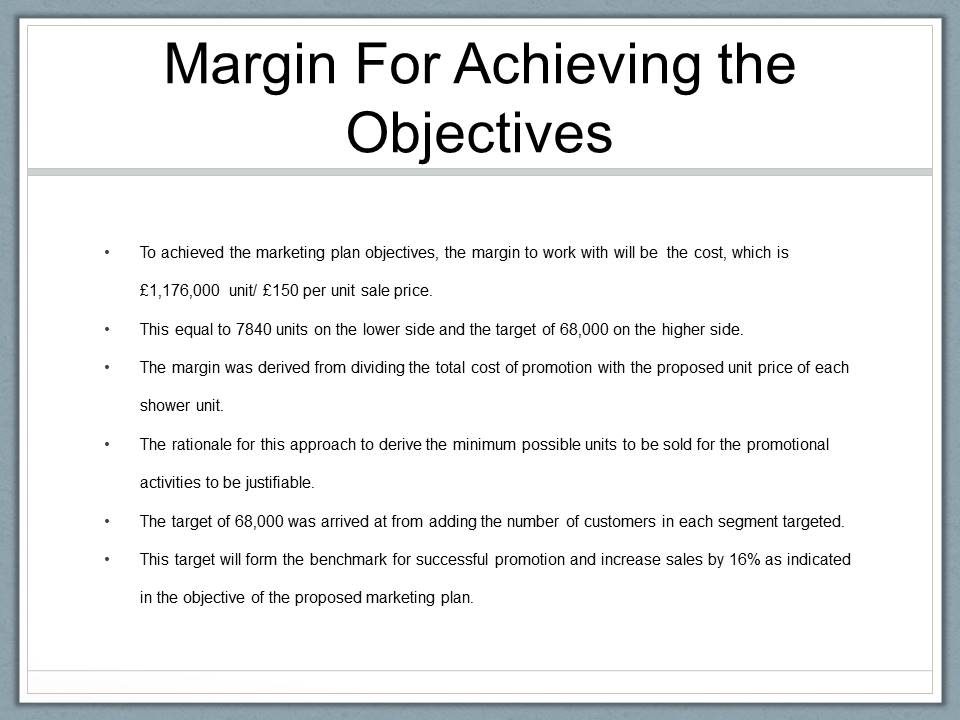
Conclusion
The proposed marketing plan is feasible since the cost and margins corresponds to targets.
The company should recruit independent retailers, 30 sales representatives, and different media channels to market the product.
The sales cycle was established to have five stages for effective sales and promotion.
The company should concentrate on the plumber, developer, and DIY markets to effectively enter and penetrate the market.
From the projection, it is expected that the company will control at least 10% of the market share at the end of the five year if the proposed marketing plan is adopted.
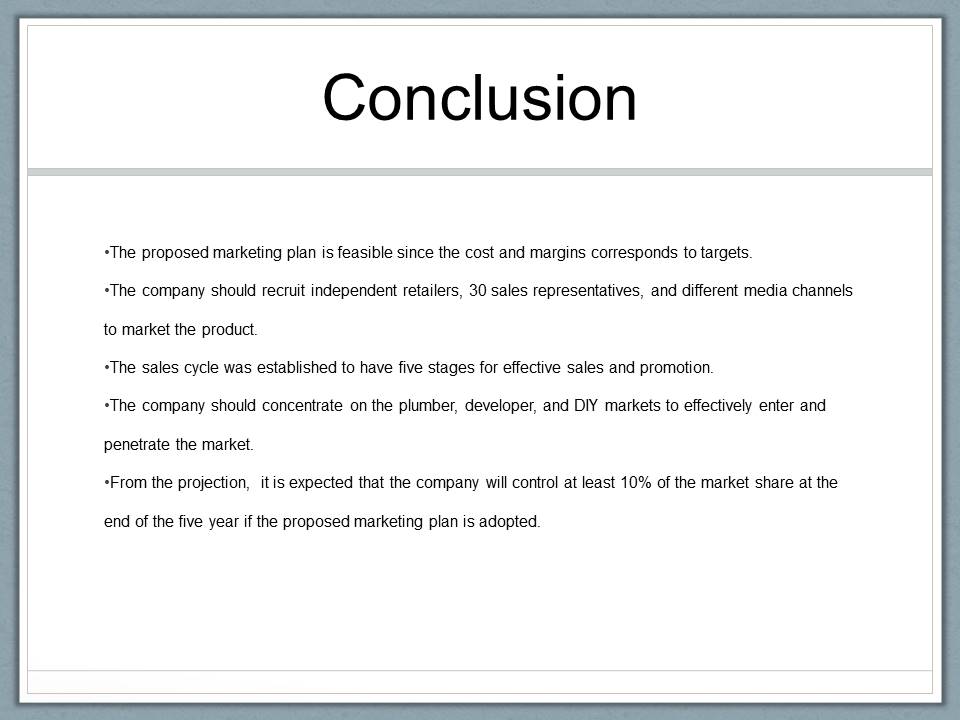
Reference List
Birdsall, C, & Johnston, N 2010, “Achieving brand driven business success,” Design Management Review, vol. 19 no. 2, pp. 67-74.
Eagle, L, Kitchen, P & Bulmer, S 2007, “Insights into interpreting Integrated marketing communications: A two-nation qualitative comparison”, European Journal of Marketing, vol. 41, no. 7/8, pp.956-970.
Elder, R & Krishna, A 2012, “The visual depiction effect in advertising: Facilitating embodied mental simulation through product orientation”, Journal of Consumer Research, vol. 38, no. 6, pp. 988-1003.
Kitchen, P, Kim, I & Shultz, D 2008, “Integrated marketing communications: Practice leads theory’, Journal of Advertising Research, vol. 48, no. 4, pp.531-546.
Kotler, P & Keller, K 2012, Marketing management, Pearson Prentice Hall, New Jersey.
Luck, E & Moffat, J 2009, “IMC: Has anything really changed? A new perspective on an old definition”, Journal of Marketing Communications, vol. 15, no. 5, pp.311-325.